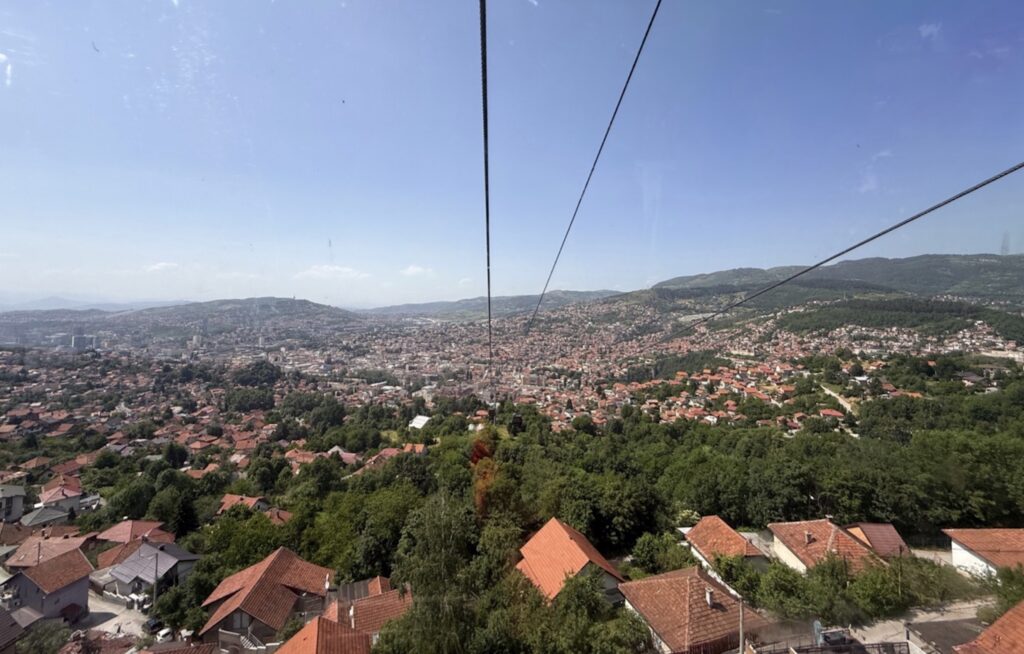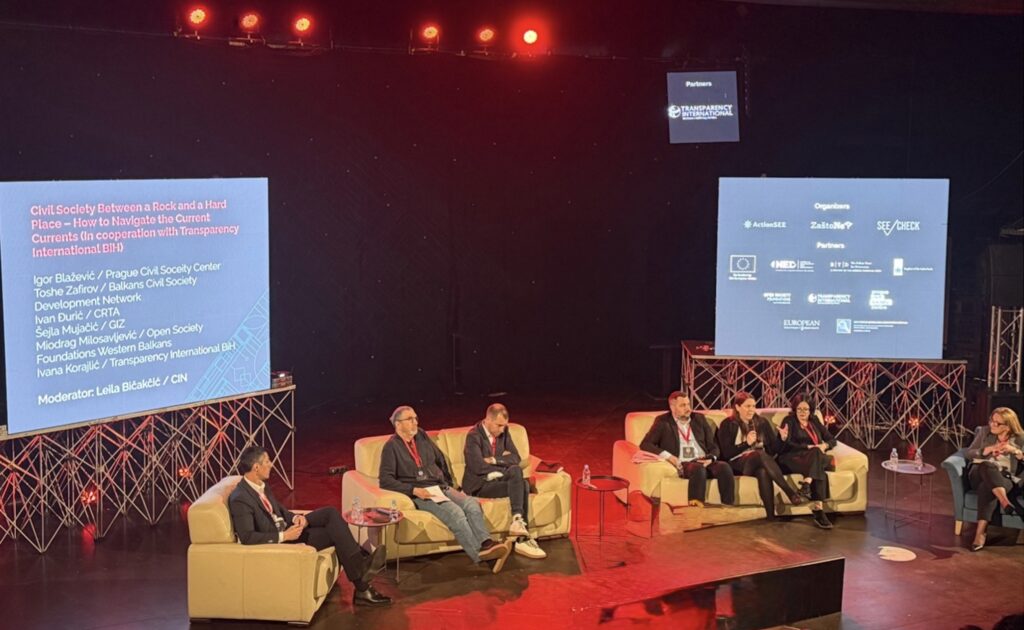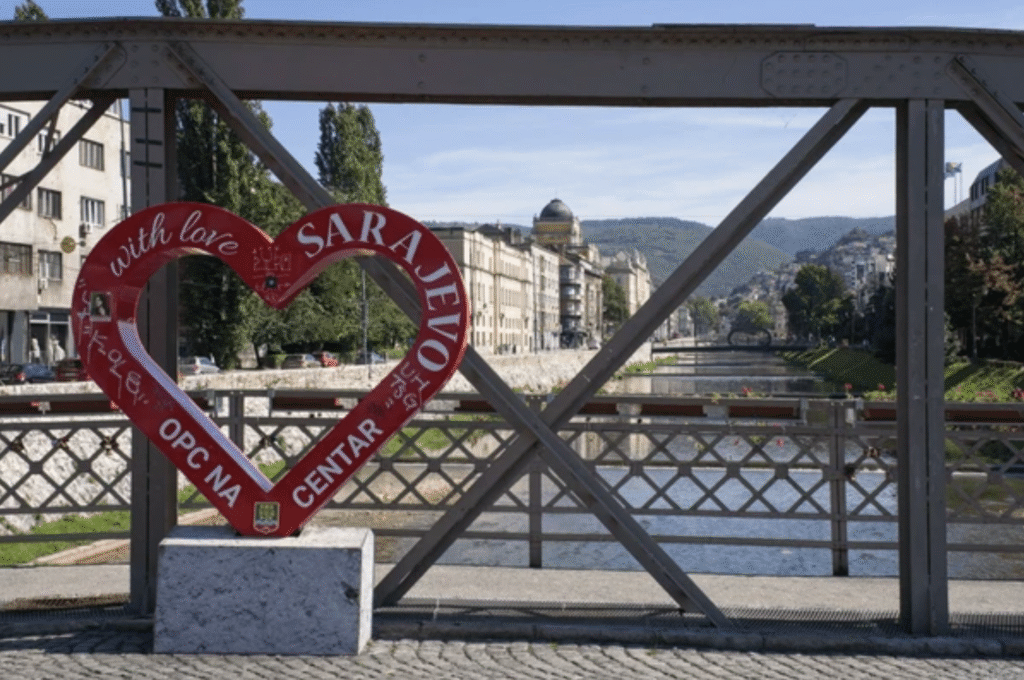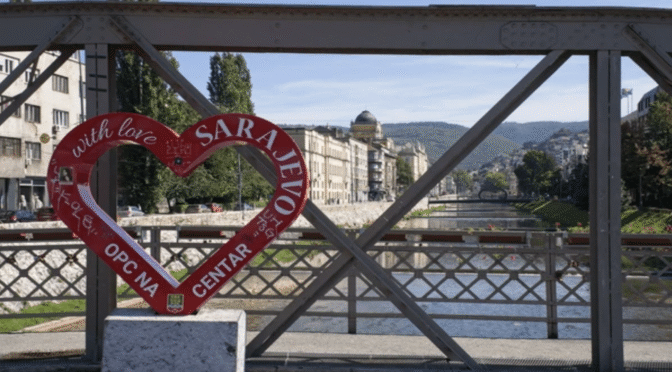By Ella Ponthier, Graduate of the UT LBJ School of Public Affairs
Zdravo! My name is Ella, and I am a May 2025 graduate of the LBJ School of Public Affairs. I received my master’s degree in Global Policy Studies with a focus on Central and Eastern European Studies. During my time at the LBJ School, I developed a strong interest in coursework on informal institutions and the state of democracy in post-communist states. Communism in this region ended, seemingly overnight, in the 1990s—but post-communist states did not automatically transform into consolidated democracies. Bosnia and Herzegovina is one of those countries.
This nation—about the size of West Virginia and with a population similar to Chicago—contains many complexities. Deep-rooted ethnic tensions, the legacy of war, and political stagnation pervade everyday life, making democratic consolidation especially difficult. At the same time, Bosnia’s rich history, the perseverance of civil society, and the enduring hope for a better future remain strong. Throughout my studies, I often asked myself: how can I contribute to democratic development in the region I’ve spent so much time researching?
Thanks to the Embedded Scholars Program, I had the opportunity to gain firsthand experience this summer by working with a nongovernmental organization in the Western Balkans, contributing directly to democratic development. For six weeks, I interned with Transparency International in Sarajevo, Bosnia and Herzegovina, where I assisted with research on transparency, accountability, and state capture.

Bosnia and Herzegovina, or Bosna i Hercegovina (BiH) in Bosnian, lies in the Western Balkans, bordered by Croatia to the northwest, Montenegro to the southeast, and Serbia to the east. Having lived under the Serbian Empire, five centuries of Ottoman rule, and as part of the Socialist Federal Republic of Yugoslavia, BiH is home to a diverse mix of ethnicities, cultures, and languages. This diversity, however, comes with significant challenges. After it declared independence from Yugoslavia in 1992, a war broke out along ethnic lines. From 1992 to 1995, Bosnian Serbs waged an ethnic war against Bosniaks (Bosnian Muslims) and minority groups. The 1995 Srebrenica Massacre—where more than 8,000 Bosniak men and boys were murdered in one week—was the largest mass killing in Europe since the Holocaust. Estimates suggest that between 100,000 and 200,000 people died during the war, with many either fleeing the country or becoming internally displaced.

Despite arms embargoes and the presence of United Nations peacekeepers, the international community struggled to end the conflict. Ultimately, the war ended on December 14, 1995 when the Bosniaks, Croats, and Serbs signed the Dayton Peace Accords. These accords established an interim governance structure, including a tri-ethnic power-sharing agreement among Bosniaks, Croats, and Serbs from the presidency to local government. While the Dayton Accords ended the war, they did not address the underlying ethnic divisions and trauma that fueled it. Today, corruption and state capture continue to undermine progress in BiH, as ethnic group leaders often prioritize their group’s interests over the common good. Nearly 30 years later, BiH still struggles to modernize, strengthen its economy, and fully integrate into Europe. While it aspires to join the European Union, it has a long way to go.
If you’re unfamiliar with Transparency International (TI), the name hints at its mission: “to stop corruption and promote transparency, accountability and integrity at all levels and across all sectors of society.” Operating in over 100 countries, TI uses advocacy, research, and education to empower citizens and institutions. Transparency is critical to democratic development. Citizens have the right to know how elected officials are using their power and resources. Without transparency, holding governments accountable becomes nearly impossible. Without accountability, transparency is less useful.

Transparency International BiH, the local branch of the organization, has offices in Sarajevo and Banja Luka. It works closely with institutions like the Parliamentary Assembly of Bosnia and Herzegovina to advocate for legislation that enhances government transparency and accountability. One key area of focus is whistleblower protection—ensuring that individuals who report corruption are protected from retaliation. TI BiH also offers free legal advice to citizens. The legal system is very complex, and many citizens do not trust government institutions. TI BiH is a place citizens can call for support and guidance on issues most important to them.

During my internship, I contributed to TI BiH’s projects on transparency in renewable energy projects and political clientelism. I researched and wrote a report on transparency and accountability in BiH’s renewable energy sector. Renewable energy is essential for BiH to protect the environment, decrease energy costs, provide reliable energy, and join the European Union. Despite having a high potential for renewable energy and receiving funds to support renewable energy growth, BiH has made little progress. This is largely due to a decentralized government structure and widespread corruption. Many state-owned enterprises responsible for renewable energy projects are associated with the major ethnic groups that run the government (Bosniaks, Croats, and Serbs). It is common for some leaders to seek to advance the best interests of their ethnic groups instead of the public good. Using BiH’s specific situation and comparing it to success stories in the EU, I provided recommendations for BiH’s renewable energy sector TI BiH can use when developing its renewable energy project.
For my final project, I supported a new initiative on political clientelism by analyzing relevant data from sources such as the Varieties of Democracy database and the Bertelsmann Stiftung Transformation Index. I examined indicators related to state capture, corruption, institutional strength, and political party structures to identify trends and common characteristics of clientelism in BiH.
Beyond the office, I also learned a lot about international advocacy. From attending conferences related to democracy promotion to learning directly from Bosnians, I achieved a more nuanced understanding of the country, its people, and the challenges it faces. One key takeaway: advocacy work is not always glamorous. You do not always achieve all of your goals. And it can take a long time. But as my coworker said, “Someone has to do the work—or no one will.”


Thank you to TI BiH for welcoming me this summer. Thank you to the Embedded Scholars Program for this amazing opportunity. I am also grateful to the Center for Russian, Eastern European, and Eurasian Studies, the Clements Center for National Security, and Texas Global for making this all possible. Most importantly, thank you to Bosnia and Herzegovina and its people for enriching my life and broadening my worldview. People are not their government. Governments do not always represent their people. While BiH is still working to become a consolidated democracy and join the EU, I remain optimistic. The organizations, like TI, and the people I met over these past six weeks will continue to push for change so that one day those dreams become a reality.
Hvala!

